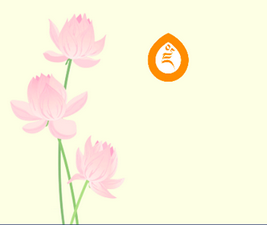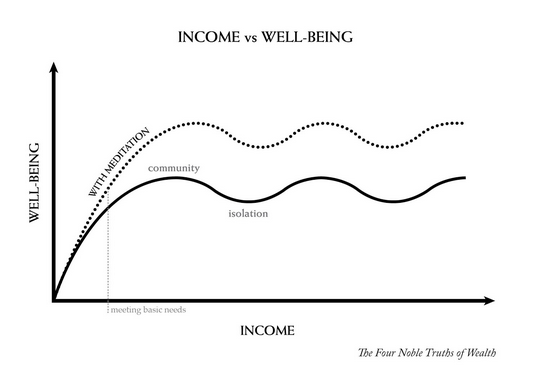Tuesday
Community ArticlesBuddhist Economics 090
 NEW COLUMN: Shambhala Economics
NEW COLUMN: Shambhala Economics
Welcome to Shambhala Economics, a column in the Shambhala Times where we publish articles on uplifted ways to view and engage in the economic side of life. Layth Matthews who is a long time student of Shambhala Buddhism and author of, “The Four Noble Truths of Wealth: a Buddhist View of Economic Life” will act as host, editor, and contributor for the column.
by Layth Matthews
E.F. Schumacher was a development economist who published an essay contrasting classical western economic approaches to employment and the distribution of wealth with what he felt a more Buddhist value system would look like. His article first published in 1966, entitled “Buddhist Economics”, made liberal reference to Buddhism’s Noble Eightfold Path. The essay was later republished in a book of Schumacher’s insightful essays, “Small is Beautiful”, which has become standard reading for students of sustainable economics.
While Schumacher illuminated the contrast between Buddhist ideology and classical economics, Chogyam Trungpa Rinpoche, a Tibetan meditation master who founded the Shambhala Lineage in the West and wrote Shambhala: The Sacred Path of the Warrior and Cutting Through Spiritual Materialism, saw economic life as inseparable from the spiritual path itself. Here are the opening lines of a talk he gave in 1979 to a group of students interested in business:
“Ladies and gentlemen, we are involved with a kind of activity that is very important for developing our sanity and propagating the dharma. Beyond that, it is important in expressing richness in the sense that the vision of Buddhadharma can expand into our lifestyle and activities as Shambhala vision. The businesses that we have developed within the sangha (community of practitioners) are connected with providing people with a social structure and a way of life, so that everybody may be benefitted.”
~ The Ratna Society, Talk Three, July 22, 1979
The modern world has developed so much, we tend to think of business as a weed, which must be cut back and managed by government and activism. There is no question that regulation is important. Nevertheless, we might require less regulation if more of us realized the spiritual possibilities of our economic activity.
Toward a Basis for Buddhist Economics
Just as there are many schools of economic thought, there are also many schools of Buddhism with unique insight to offer, including how best to regard and navigate economic life.
There is, however, a wonderful slogan from the 11th century Buddhist sage, Atisa, “All dharmas agree at one point”, which means despite different approaches, all schools can agree that the misapprehension of a permanent egocentric identity is the root cause of suffering.
The word buddha means awakened one which refers to the Buddha’s discovery of the wisdom and nobility inherent in all human beings. This self-existing brilliance is variously referred to as buddha nature, primordial purity, and basic goodness and is believed to predate, penetrate, and transcend any fixed notions of a self.
All of this is to say that any definition of Buddhist Economics must recognize the pre-existing completeness of human beings. To proceed from there into the realms of household decision-making and socio-economic policy is to seek ways to help individuals and groups establish and sustain this unconditionally wealthy outlook.
From the Buddhist point of view a profoundly wealthy outlook is based on perception and trust in the inherent purity of who we are, as we are, on the spot. Human beings do not ultimately require any prerequisites or credentials to be rich. True perception is wealth itself in the original and ultimate form. The view of basic goodness is also the basis of a forward looking outlook as there is no need to second guess the worthiness or completeness of oneself or others. The freedom from such insecurities is the basis of a genuinely open-minded outlook and the transcendence of materialism. The accuracy of such an outlook is also very helpful for improving material situations as needed.
Material wealth can contribute greatly to the process of developing a wealthy outlook, especially at very low levels of income. We need basic security in its various forms to raise our gaze to a larger view. But too often we mistake the basic security of material wealth for wealthiness itself, which leads us to the choices that keep us in trouble. This habitual fixation on material solutions is called materialism, which has earnest beginnings, but sabotages sustainability in the end. We are experiencing that on a global scale in the form of climate change and extremes of poverty and wealth right now.
What is the nature of a wealthy outlook, beyond materialism? It is the ability to appreciate the richness in a situation without the encumbrance of an egotistical reference point. A reference point beyond ego naturally places a higher utility on the well-being of others than oneself. The egocentric obsession narrows our view, blockades our perception, and applies a judgmental yardstick to experience.
The Golden Path of Sitting Meditation
Chogyam Trungpa Rinpoche, the first Sakyong of Shambhala, was fond of referring to sitting meditation as the ultimate luxury situation. This was not because long periods of sitting meditation are so reliably comfy, as we know. It was because sitting meditation is the most direct way for human beings to practice connecting with the spontaneously occurring nature of wealth, which is inseparable from the nature of mind.
Our ability to perceive and appreciate our own experience is the first instance of intelligence, humor, and genuine confidence. From the Buddhist point of view this is ultimate wealth because these are the things we want our material wealth to ultimately buy us. All of our perceptions and attitudes must pass through the filter of mind; so it behooves us to understand better how mind works. Sitting meditation is the means to do that.
Our relationship with material wealth can support or undermine our well-being depending on how well we understand the role of mind. The practice of sitting meditation reveals the trustworthiness of unfettered psychological space, which we can then recognize and reconnect with in the course of other activities as well.
If we regard our material resources as means to help ourselves and others discover wealthiness in a more sustainable way, it will give us the widest set of options to navigate any situation as it arises.
A wealthy outlook is not ignorant of refinement or of lucrative business opportunities. It is simply free of the need for confirmation socially, materially, or spiritually for that matter, and sees no separation between self-interest and the well-being of others at all.
More information about this chart can be found by clicking here.
~~
 Layth Matthews, is Senior Mortgage Advisor and CEO of RateMiser Mortgage Advisors and the Author of “The Four Noble Truths of Wealth: a Buddhist view of economic life”. He is a Shambhala Training Director and a Former Director of the Victoria Shambhala Center. He lives in Victoria, British Columbia, Canada with his wife and three children.
Layth Matthews, is Senior Mortgage Advisor and CEO of RateMiser Mortgage Advisors and the Author of “The Four Noble Truths of Wealth: a Buddhist view of economic life”. He is a Shambhala Training Director and a Former Director of the Victoria Shambhala Center. He lives in Victoria, British Columbia, Canada with his wife and three children.

















